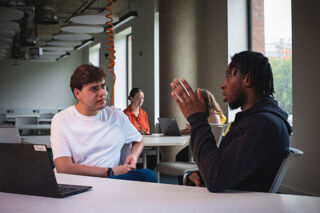Thinking about studying a Computing degree? If so, you’ve picked an exciting industry, with a bigger demand than ever for jobs. Computing is a huge part of our everyday life and with new inventions and chances for innovation, embarking on a career in computing has never been so exciting.
What Can I Do with a Computing Degree?
In today’s digital world, computing is at the heart of almost every industry. From powering smart devices to protecting sensitive data, a computing degree opens doors to a wide range of exciting and impactful careers.
Computing degrees combine theory and practical study, providing you with a number of skills that employers are looking for. Below you’ll find just a few of the exciting career paths you can go into after studying one of the many computing degrees available.
Artificial Intelligence (AI)
AI is transforming the way we live and work, from voice assistants to self-driving cars. With a background in computing, you could become a machine learning engineer, data scientist, or AI researcher. These roles involve designing algorithms that can analyse data, recognise patterns, and even make decisions. The demand for AI professionals is rapidly growing, making this one of the most future-focused career routes. Our courses in Artificial Intelligence and Computer Science with AI level will equip with the skills to tackle the exciting challenges ahead in this field.
Computer Science
Computer science is the backbone of computing degrees. Careers here include software developer, systems analyst, or researcher working on next-generation technologies. Our Computer Science degree equips you with problem-solving, programming, and mathematical skills that can be applied to almost any sector, from healthcare and finance to gaming and entertainment.
Cyber Security and Networks
As our reliance on technology grows, so does the risk of cyber threats. Specialising in cyber security can lead to roles such as security analyst, ethical hacker, or network architect. These professionals protect organisations from attacks, secure data, and build resilient systems. With cybercrime on the rise, skilled security experts are in constant demand. Our degrees in Cyber Security and Computer Networks and Security will equip you with the skills to tackle cyber-crime head on.
Computing
Find out more about our courses
Software Engineering
Software engineering focuses on designing, building, and maintaining the applications and systems we use every day. From mobile apps to large-scale business software, engineers ensure that technology is functional, efficient, and user-friendly. Careers in this area include software developer, QA engineer, or project manager, offering both technical and creative opportunities. We are excited to launch our new degree in Software Engineering from September 2026.
Information Technology (IT)
IT professionals keep organisations running smoothly by managing hardware, software, and digital infrastructure. Possible careers include IT support specialist, systems administrator, or cloud solutions architect. With the rise of cloud computing and remote work, IT expertise is essential for businesses of all sizes. Our courses in Business Information Technology and Computing and Information Technology are a fantastic introduction into this field.
Final Thoughts
A computing degree doesn’t lock you into a single path — it provides a foundation that can lead to diverse and rewarding careers. Whether you’re drawn to the innovation of AI, the security of networks, or the creativity of software design, computing skills are your passport to shaping the future.
